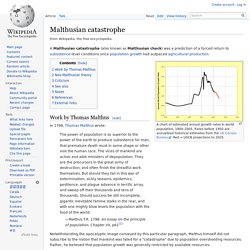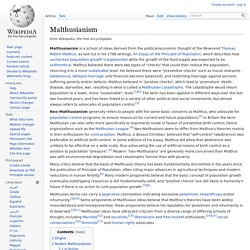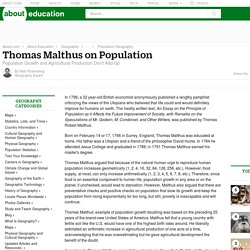

A-level Geography Population Revision - Population models. It is possible you will be asked about the consequences of Population growth.

Firstly, it is important that you appreciate two contrasting viewpoints. The first is from Malthus, who was writing at the end of the 18th century. He believed that only bad could come from population growth. Population he said grows faster than food supply. This he said was because food supply can only grow arithmetically, for example, 1 then 2 then 3-4-5-6-7-8 but, population grows geometrically 2-4-8-16-32-64. Consequently, there is no way food supply can keep up with population growth. GCSE Bitesize: Theories of resource consumption. Thinkgeogwiki - Malthus vs Boserup. CAC-IB-Geography - Paul Ehrlich. Reason vs Faith: Julian Simon vs Paul Ehrlich - Capitalism Magazine. Simon–Ehrlich wager. Julian L.

Simon and Paul Ehrlich entered in a widely followed scientific wager in 1980, betting on a mutually agreed-upon measure of resource scarcity over the decade leading up to 1990. Simon had Ehrlich choose five commodity metals. Copper, chromium, nickel, tin, and tungsten were chosen and Simon bet that their prices would decrease, while Ehrlich bet they would increase. The contest occurred in the pages of Social Science Quarterly, where Simon challenged Ehrlich to put his money where his mouth was.
In response to Ehrlich's published claim that "If I were a gambler, I would take even money that England will not exist in the year 2000"—a proposition Simon regarded as too silly to bother with—Simon countered with "a public offer to stake US$10,000 ... on my belief that the cost of non-government-controlled raw materials (including grain and oil) will not rise in the long run. " But Why Did Julian Simon Win The Paul Ehrlich Bet? Simon-Ehrlich wager.
Julian L.

Simon and Paul Ehrlich entered in a famous wager in 1980, betting on a mutually agreed upon measure of resource scarcity over the decade leading up to 1990. Simon had Ehrlich choose five of several commodity metals. Malthusian Theory of Population. Malthusian catastrophe. A chart of estimated annual growth rates in world population, 1800–2005.

Rates before 1950 are annualized historical estimates from the US Census Bureau. Red = USCB projections to 2025. Work by Thomas Malthus[edit] In 1798, Thomas Malthus wrote: The power of population is so superior to the power of the earth to produce subsistence for man, that premature death must in some shape or other visit the human race. Notwithstanding the apocalyptic image conveyed by this particular paragraph, Malthus himself did not subscribe to the notion that mankind was fated for a "catastrophe" due to population overshooting resources. The passion between the sexes has appeared in every age to be so nearly the same that it may always be considered, in algebraic language, as a given quantity. Neo-Malthusian theory[edit] Wheat yields in developing countries, 1950 to 2004, in kg/ha (baseline 500). Growth in food production has been greater than population growth. Criticism[edit] Population, Sustainability, and Malthus: Crash Course World History 215. Thomas Robert Malthus.
The Reverend Thomas Robert Malthus FRS (13 February 1766 – 29 December 1834[1]) was an English cleric and scholar, influential in the fields of political economy and demography.[2] Malthus himself used only his middle name Robert.[3] His An Essay on the Principle of Population observed that sooner or later population will be checked by famine and disease, leading to what is known as a Malthusian catastrophe.

He wrote in opposition to the popular view in 18th-century Europe that saw society as improving and in principle as perfectible.[4] He thought that the dangers of population growth precluded progress towards a utopian society: "The power of population is indefinitely greater than the power in the earth to produce subsistence for man".[5] As a cleric, Malthus saw this situation as divinely imposed to teach virtuous behaviour.[6] Malthus wrote: Malthus placed the longer-term stability of the economy above short-term expediency. Early life and education[edit] The Pessimists. What evidence supports him?

When he was writing, there were great problems of poverty in rural Britain which he suggested were as a result of overpopulation. After his death, agricultural technology improved greatly and the situation improved in many rural areas. Life expectancy in Kenya -- 56 before the AIDS epidemic -- is expected to plunge to 42 by 2010. Is this a result of overpopulation or just as a result of the spread of AIDS? This link will take you to a website that asks the key question, "Was Malthus right? " Ehrlich claims that many of the world's famines are attributable to overpopulation and he is also concerned about the impact that Julian Simon's "technological solutions" are having on the planet. Malthusianism. Malthusianism is a school of ideas derived from the political/economic thought of the Reverend Thomas Robert Malthus, as laid out in his 1798 writings, An Essay on the Principle of Population, which describes how unchecked population growth is exponential while the growth of the food supply was expected to be arithmetical.

Malthus believed there were two types of "checks" that could then reduce the population, returning it to a more sustainable level. He believed there were "preventive checks" such as moral restraints (abstinence, delayed marriage until finances become balanced), and restricting marriage against persons suffering poverty and/or defects. Malthus believed in "positive checks", which lead to 'premature' death: disease, starvation, war, resulting in what is called a Malthusian catastrophe. Origins[edit] Malthus was not the first to outline the problems he perceived.
One of the earliest critics was David Ricardo. Modern Malthusianism[edit] In fiction[edit] See also[edit] Thomas Malthus on Population. In 1798, a 32 year-old British economist anonymously published a lengthy pamphlet criticizing the views of the Utopians who believed that life could and would definitely improve for humans on earth.

The hastily written text, An Essay on the Principle of Population as it Affects the Future Improvement of Society, with Remarks on the Speculations of Mr. Godwin, M. Condorcet, and Other Writers, was published by Thomas Robert Malthus. Born on February 14 or 17, 1766 in Surrey, England, Thomas Malthus was educated at home. His father was a Utopian and a friend of the philosopher David Hume.